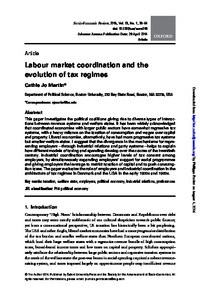Labour market coordination and the evolution of tax regimes

2015
13
1
January
33-54
history ; labour relations ; tax system ; welfare state ; employers role
Social protection
http://dx.doi.org/10.1093/ser/mwu018
English
Bibliogr.
"This paper investigates the political coalitions giving rise to diverse types of interactions between revenue systems and welfare states. It has been widely acknowledged that coordinated economies with larger public sectors have somewhat regressive tax systems, with a heavy reliance on the taxation of consumption and wages over capital and property. Liberal economies, alternatively, have had more progressive tax systems but smaller welfare states. I suggest that the divergence in the mechanisms for representing employers—through industrial relations and party systems—helps to explain how different models of taxing and spending develop over the course of the twentieth century. Industrial coordination encourages higher levels of tax consent among employers, by simultaneously expanding employers' support for social programmes and giving employers the leverage to restrict taxation of capital and to push consumption taxes. The paper evaluates the role of employers and industrial coordination in the architecture of tax regimes in Denmark and the USA in the early 1900s and 1960s."
Digital
The ETUI is co-funded by the European Union. Views and opinions expressed are however those of the author(s) only and do not necessarily reflect those of the European Union or the ETUI.